The Man Who Changed His Name is a mystery play by the British writer Edgar Wallace, which was first staged in 1928. A young woman begins to suspect that her wealthy, respectable husband may be an escaped Canadian murderer.
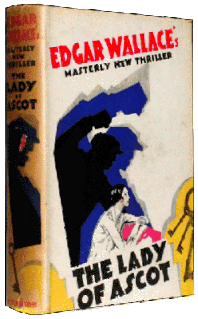
The Lady of Ascot is a 1930 crime novel by the British writer Edgar Wallace. It is a loose novelisation of Wallace's 1921 play M'Lady about a woman attempting to raise her daughter in high society whose plans are threatened by the return of her husband who has been serving a sentence at Broadmoor for the murder of a police officer.
Persons Unknown is a 1929 mystery play by the British writer Edgar Wallace. The plot revolves around the murder of a "person unknown" in a street by a mysterious blackmailer. It features the character of Sergeant Elk, a Scotland Yard detective who appeared in several of Wallace's novels.
M'Lady is a 1921 play by the British writer Edgar Wallace. It is a drama about a woman who tries to raise her daughter in high society, only for her husband to return from Broadmoor where he has been serving a sentence for killing a police officer. It was panned by theatre critics.
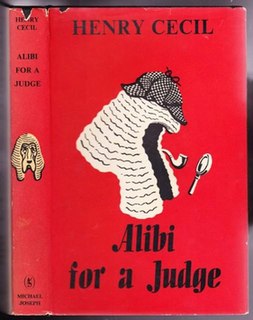
Alibi for a Judge is a 1960 comedy crime novel by the British writer Henry Cecil. After sentencing a man to serve ten years in prison, a worrisome judge becomes concerned that the alibi provided by his wife may in fact be true.

Settled Out of Court is a 1959 comedy crime novel by the British writer Henry Cecil. It was published in the United States by Harper.

A Woman Named Anne is a 1967 comedy novel by the British writer Henry Cecil. The plot revolves around a divorce case involving a woman accused of adultery, who clashes with the lawyer ranged against her.

The Box Office Murders is a 1929 detective novel by the Irish-born writer Freeman Wills Crofts. It is the fifth in his series of novels featuring Inspector French, a prominent figure of the Golden Age of Detective Fiction. It was published in the United States the same year by Harper under the alternative title The Purple Sickle Murders.
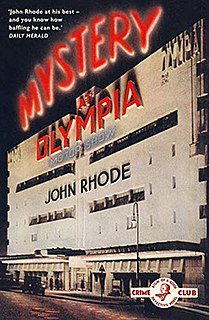
Mystery at Olympia is a 1935 detective novel by John Rhode, the pen name of the British writer Cecil Street. It is the twenty second in his long-running series of novels featuring Lancelot Priestley, an armchair detective who was able to solve mysteries without visiting the scene of the crime. It was published in the United States under the alternative title Murder at the Motor Show.

Death in the Hopfields is a 1937 detective novel by John Rhode, the pen name of the British writer Cecil Street. It is the twenty fifth in his long-running series of novels featuring Lancelot Priestley, a Golden Age armchair detective. It was published in America by Dodd Mead under the alternative title The Harvest Murder.

Invisible Weapons is a 1938 detective novel by John Rhode, the pen name of the British writer Cecil Street. It is the twenty eighth in his long-running series of novels featuring Lancelot Priestley, a Golden Age armchair detective. A locked room mystery, the title revolves around the fact that two murders are committed by apparently invisible methods.

Death in Harley Street is a 1946 detective novel by John Rhode, the pen name of the British writer Cecil Street. It is the forty third in his long-running series of novels featuring Lancelot Priestley, a Golden Age armchair detective. Several sources consider it to be the author's masterpiece.
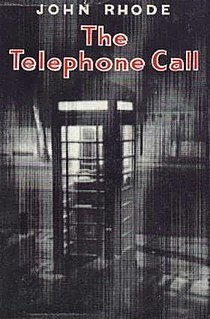
The Telephone Call is a 1948 detective novel by John Rhode, the pen name of the British writer Cecil Street. It is the forty seventh in his long-running series of novels featuring Lancelot Priestley, a Golden Age armchair detective. It was published in America by Dodd Mead under the alternative title Shadow of an Alibi. It is based on the real-life Wallace Case of 1931 in which William Herbert Wallace was convicted of murdering his wife Julia, a conviction which was later overturned on appeal.

Beware Your Neighbour is a 1951 detective novel by the British writer Cecil Street, writing under the pen name of Miles Burton. It was part of a lengthy series of books featuring the detective Desmond Merrion and Inspector Arnold of Scotland Yard. Unlike much of the series it takes place in suburban rather than rural England. Reviewing the novel in The Spectator Esther Howard wrote " I always find that Mr. Burton has nearly the most colourless detectives, prose-style and plots of anyone in the business, and Beware Your Neighbour, death in an exclusive thoroughfare, though mechanically adequate, is entirely devoid of excitement."
Dr. Priestley's Quest is a 1926 detective novel by John Rhode, the pen name of the British writer Cecil Street. It was the second appearance of the armchair detective Lancelot Priestley, who featured in a long-running series of novels during the Golden Age of Detective Fiction. It has been described as the first major detective novel by the author. In its relationship between Priestley and his secretary and future son-in-law Harold Merefield is shown the influence of Conan Doyle's Sherlock Holmes and Watson. Similarly, Inspector Hanslet of Scotland Yard fulfils a similar role to that of Lestrade.

The Ellerby Case is a 1927 detective novel by John Rhode, the pen name of the British writer Cecil Street. It marked the third appearance of the armchair detective Lancelot Priestley, who featured in a long-running series of novels during the Golden Age of Detective Fiction. The novel's success led to a contract with Dodd Mead to release it and subsequent novels in the United States, in what proved to be a lucrative arrangement for the author.

The Murders in Praed Street is a 1928 detective novel by John Rhode, the pen name of the British writer Cecil Street. It features the fourth appearance of the armchair detective Lancelot Priestley, who figured in a long-running series of novels during the Golden Age of Detective Fiction.

The House on Tollard Ridge is a 1929 detective novel by John Rhode, the pen name of the British writer Cecil Street. It marked the sixth appearance of the armchair detective Lancelot Priestley, who featured in a long-running series of novels during the Golden Age of Detective Fiction. The plot was partly inspired by Rudyard Kipling's short story Wireless, which Rhode mentions in the novel.
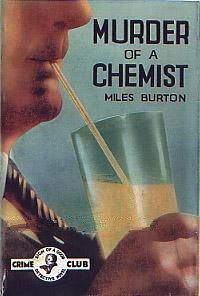
Murder of a Chemist is a 1936 detective novel by the British writer Cecil Street, writing under the pen name of Miles Burton. It is the fourteenth in a series of books featuring the Golden Age amateur detective Desmond Merrion and Inspector Arnold of Scotland Yard.
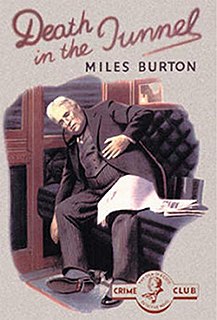
Death in the Tunnel is a 1936 detective novel by the British writer Cecil Street, writing under the pen name of Miles Burton. It is the thirteenth in a series of books featuring the amateur detective Desmond Merrion and Inspector Arnold of Scotland Yard. It was published in the United States by Doubleday the same year under the alternative title Dark is the Tunnel. Originally published by Collins Crime Club, it was reissued in 2016 by the British Library Publishing as part of a group of crime novels from the Golden Age of Detective Fiction. It is part of a subgenre of novels where murders take place on railway lines including the same author's Tragedy on the Line and Dead on the Track
















